#I have something for people and characters who embody a place
Text
Do you think the Abyss has a scent?
(I always imagined it's not unpleasant, just inhuman. Ink, ozone, hot metal, good agarwood oil. Real agarwood oil, the one that smells of dark wood and mint and fur of celestial foxes)
Do you think Childe smells of it sometimes?
(Even his basic elemental skill is abyssal in nature, after all. Something must cling)
Do you think whoever you ship with the guy eventually starts to think of it as "home"?
Do you think they go into the Chasm or Enkanomiya and recognize it?
#things occupying my brain#childe#tartaglia#chilumi#do you think lumine says to herself 'if the abyss is good enough for my brother then I have no problem with it'?#I have something for people and characters who embody a place#who let it manifest through them#this boy kind of does#if abyss be thy name I pledge to you my loyalty#chaeya#I think this fits chaeya even better than chilumi
122 notes
·
View notes
Note
Infinity Train isn't the best counterpart to Last of Us on positive representation. Remember the only explicitly Neurodivergent character in Infinity Train became a villain and died brutally on screen?
No, I don't remember. But what I do remember is that the entire core concept of the show is basically "a train that puts people through magical therapy." And so I remember that nearly every lead character is clearly dealing with some form of mental illness or another. I don't need every character to be explicitly diagnosed onscreen to know that the show is chock-full of neurodivergent characters, so I'm quite genuinely not sure what you mean. Have I missed something?
#like correct me if I'm wrong but i recall Simon's inability to see other living creatures as fully alive came from a place of entitlement#and i didn't see it as an accident that it was the white boy who was ultimately unable to break free of the power it gave him#but like. I don't know how a neurodivergent person can watch season 2 and come away with#the idea that MT is somehow a neurotypical character written by a neurotypical person#and in season 4 the guys fight a monster that is the literal embodiment of depression. am i missing something?#what does simon have? i don't recall him explicitly stating a mental illness or difference. maybe I've forgotten#but like. all the characters are mentally ill. for some of them that is why they are on the train!#having all of them state an official medical diagnosis would not only be distracting but impossible in some cases#mt doesn't have access to mental health services how could they know??#simon was a mentally ill person who got so fucking sucked into the comfort and power of cultism that he was lost and it was a tragedy#I never got the impression that this was because he was more mentally ill than other people on the train.#just like how people who get really into conspiracy theories are not doing it because they are mentally ill.#illness might make them more vulnerable to brainwashing but there is a DRIVE that has to be there too.#and very often that drive is a kind of hatred and insecurity that cannot be reasoned with. it is a tragedy. a very real tragedy.#original
4 notes
·
View notes
Note
What should you do if you feel that two of the characters are too similar and want to distinguish their personalities?
Characterization: Unforgettable Characters
I would say that's the whole point of characterization! Often we write about characters with similar ages, ethnicities, place of residence, etc.
It's all about: "How memorable is this particular character?"
Unusual Physical Features
Give your characters one distinguishable physical feature that can be referenced throughout.
Maybe one of them come from a family of redheads. It can be as simple as making one of them wear glasses.
The way we look, and the reactions we get from other people about our looks, form a large part of our own self-perception. This is especially true if your characters are teens, or have a job where they need to be particular about how they appear.
Quirky Body Language/Habits
Come up with some memorable, uncommon gestures that comes naturally to your characters. It can be something they do unconsciously.
What makes them make those gestures consistently?
A Distinct Character Voice
Dialogue is the window to the minds of your characters.
Give them a stock phrase that they use often, or a speech pattern
Give one of them a stutter, a lisp, a particular way of pronouncing some words, etc.
Nicknames (or teling names)
Nicknames are easy if your characters are part of the same group of friends or one of them has a reputation (whether god or bad)
You can also choose to give them telling names that hint at an immediately distinguishable characteristic, although this may feel shallow depending on the overall tone of your story.
What Do They Represent?
Characters often reflect types of people we have met in real life. Or, they personify certain values/perceptions we hold about the world in general.
If a character is the embodiment of "the silent genius", the way he carries himself would be totally different from "the forever insecure", although the two of them may simply appear quiet to someone who doesn't know them.
Think about what made you write those characters in the first place. Which archetype/person type did you want them to represent?
Combine The Characters
Sometimes, one of the two indistinguishable characters may not be serving a role that is big enough.
If there's not much story material to be divided between two characters, combine them into one, see what changes, and move on.
#writers block#writing#creative writing#creative writers#helping writers#writers and poets#writers on tumblr#poets and writers#writeblr#resources for writers#let's write#writerscommunity#writing inspiration#writing prompt#writing community#writing tips#writer stuff#writing advice#on writing#writer#writers of tumblr#writers community#writers life#writing problems#writing process#writing progress#writing practice#character writing
635 notes
·
View notes
Text
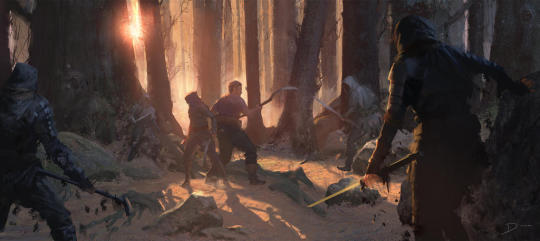
Monsters Reimagined: Bandits
As a game of heroic fantasy that centers so primarily on combat, D&D is more often than not a game about righteous violence, which is why I spend so much time thinking about the targets of that violence. Every piece of media made by humans is a thing created from conscious or unconscious design, it’s saying something whether or not its creators intended it to do so.
Tolkien made his characters peaceloving and pastoral, and coded his embodiment of evil as powerhungry, warlike, and industrial. When d&d directly cribbed from Tolkien's work it purposely changed those enemies to be primitive tribespeople who were resentful of the riches the “civilized” races possessed. Was this intentional? None can say, but as a text d&d says something decidedly different than Tolkien.
That's why today I want to talk about bandits, the historical concept of being an “outlaw”, and how media uses crime to “un-person” certain classes of people in order to give heroes a target to beat up.
Tldr: despite presenting bandits as a generic threat, most d&d scenarios never go into detail about what causes bandits to exist, merely presuming the existence of outlaws up to no good that the heroes should feel no qualms about slaughtering. If your story is going to stand up to the scrutiny of your players however, you need to be aware of WHY these individuals have been driven to banditry, rather than defaulting to “they broke the law so they deserve what’s coming to them.”
I got to thinking about writing this post when playing a modded version of fallout 4, an npc offhndedly mentioned to me that raiders (the postapoc bandit rebrand) were too lazy to do any farming and it was good that I’d offed them by the dozens so that they wouldn’t make trouble for those that did.
That gave me pause, fallout takes place in an irradiated wasteland where folks struggle to survive but this mod was specifically about rebuilding infrastructure like farms and ensuring people had enough to get by. Lack of resources to go around was a specific justification for why raiders existed in the first place, but as the setting became more arable the mod-author had to create an excuse why the bandit’s didn’t give up their violent ways and start a nice little coop, settling on them being inherently lazy , dumb, and psychopathic.
This is exactly how d&d has historically painted most of its “monstrous humanoid” enemies. Because the game is ostensibly about combat the authors need to give you reasons why a peaceful solution is impossible, why the orcs, goblins, gnolls (and yes, bandits), can’t just integrate with the local town or find a nice stretch of wilderness to build their own settlement on and manage in accordance with their needs. They go so far in this justification that they end up (accidently or not) recreating a lot of IRL arguments for persecution and genocide.
Bandits are interesting because much like cultists, it’s a descriptor that’s used to unperson groups of characters who would traditionally be inside the “not ontologically evil” bubble that’s applied to d&d’s protagonists. Break the law or worship the wrong god says d&d and you’re just as worth killing as the mindless minions of darkness, your only purpose to serve as a target of the protagonist’s righteous violence.
The way we get around this self-justification pitfall and get back to our cool fantasy action game is to relentlessly question authority, not only inside the game but the authors too. We have to interrogate anyone who'd show us evil and direct our outrage a certain way because if we don't we end up with crusades, pogroms, and Qanon.
With that ethical pill out of the way, I thought I’d dive into a listing of different historical groups that we might call “Bandits” at one time or another and what worldbuilding conceits their existence necessitates.
Brigands: By and large the most common sort of “bandit” you’re going to see are former soldiers left over from wars, often with a social gap between them and the people they’re raiding that prevents reintegration ( IE: They’re from a foreign land and can’t speak the local tongue, their side lost and now they’re considered outlaws, they’re mercenaries who have been stiffed on their contract). Justifying why brigands are out brigading is as easy as asking yourself “What were the most recent conflicts in this region and who was fighting them?”. There’s also something to say about how a life of trauma and violence can be hard to leave even after the battle is over, which is why you historically tend to see lots of gangs and paramilitary groups pop up in the wake of conflict.
Raiders: fundamentally the thing that has caused cultures to raid eachother since the dawn of time is sacristy. When the threat of starvation looms it’s far easier to justify potentially throwing your life away if it means securing enough food to last you and those close to you through the next year/season/day. Raider cultures develop in biomes that don’t support steady agriculture, or in times where famine, war, climate change, or disease make the harvests unreliable. They tend to target neighboring cultures that DO have reliable harvests which is why you frequently see raiders emerging from “the barbaric frontier” to raid “civilization” that just so happens to occupy the space of a reliably fertile river valley. When thinking about including raiders in your story, consider what environmental forces have caused this most recent and previous raids, as well as consider how frequent raiding has shaped the targeted society. Frequent attacks by raiders is how we get walled palaces and warrior classes after all, so this shit is important.
Slavers: Just like raiding, most cultures have engaged in slavery at one point or another, which is a matter I get into here. While raiders taking captives is not uncommon, actively attacking people for slaves is something that starts occurring once you have a built up slave market, necessitating the existence of at least one or more hierarchical societies that need more disposable workers than then their lower class is capable of providing. The roman legion and its constant campaigns was the apparatus by which the imperium fed its insatiable need for cheap slave labor. Subsistence raiders generally don’t take slaves en masse unless they know somewhere to sell them, because if you’re having trouble feeding your own people you’re not going to capture more ( this is what d&d gets wrong about monstrous humanoids most of the time).
Tax Farmers: special mention to this underused classic, where gangs of toughs would bid to see who could collect money for government officials, and then proceed to ransack the realm looking to squeeze as much money out of the people as possible. This tends to happen in areas where the state apparatus is stretched too thin or is too lighthanded to have established enduring means of funding. Tax farmers are a great one-two punch for campaigns where you want your party to be set up against a corrupt authority: our heroes defeat the marauding bandits and then oh-no, turns out they were not only sanctioned by the government but backed by an influential political figure who you’ve just punched in the coinpurse. If tax farming exists it means the government is strong enough to need a yearly budget but not so established (at least in the local region) that it’s developed a reliably peaceful method of maintaining it.
Robber Baron: Though the term is now synonymous with ruthless industrialists, it originated from the practice of shortmidned petty gentry (barons and knights and counts and the like) going out to extort and even rob THEIR OWN LANDS out of a desire for personal enrichment/boredom. Schemes can range from using their troops to shake down those who pass through their domain to outright murdering their own peasants for sport because you haven’t gotten to fight in a war for a while. Just as any greed or violence minded noble can be a robber baron so it doesn’t take that much of a storytelling leap but I encourage you to channel all your landlord hate into this one.
Rebels: More than just simple outlaws, rebels have a particular cause they’re a part of (just or otherwise) that puts them at odds with the reigning authority. They could violently support a disfavoured political faction, be acting out against a law they think is unjust, or hoping to break away from the authority entirely. Though attacks against those figures of authority are to be expected, it’s all too common for rebels to go onto praying on common folk for the sake of the cause. To make a group of rebels worth having in your campaign pinpoint an issue that two groups of people with their own distinct interests could disagree on, and then ratchet up the tension. Rebels have to be able to beleive in a cause, so they have to have an argument that supports them.
Remnants: Like a hybrid of brigands, rebels, and taxfarmers, Remnants represent a previously legitimate system of authority that has since been replaced but not yet fully disappeared. This can happen either because the local authority has been replaced by something new (feudal nobles left out after a monarchy toppling revolution) or because it has faded entirely ( Colonial forces of an empire left to their own devices after the empire collapses). Remnants often sat at the top of social structures that had endured for generations and so still hold onto the ghost of power ( and the violence it can command) and the traditions that support it. Think about big changes that have happened in your world of late, are the remnants looking to overturn it? Win new privilege for themselves? Go overlooked by their new overlords?
Art
#monsters reimagined#bandits#dnd#dungeons and dragons#d&d#ttprg#pathfinder#heavy topics#monsters reimagined
1K notes
·
View notes
Text
Regarding Death Wolf...
Hear me out (NO, it's not the kind you are thinking)
We know Death has a job, right? To collect souls and most likely release them to the afterlife.
And for this job, he has to be there when somebody is about to die, as demostrated with him being there moments before Puss' eight death.
Supposing he is THE Death and he has been doing this since the beginning of time (or at least when there were enough stories of the Grim Reaper to adquire a physical form) that means he has seen a lot, A LOT of awful things.
Murders, suicides, massacres, death of infants, people who didn't deserve to die alone, animal cruelty, some other heavy stuff I won't mention here, etc etc etc.
And we thought "man, how is he able to cope with all of that? That job has to be utter torture for someone."
Probably many of you could think that he is able to do that because he is Death, and he was "born" with that purpose and only him can reap souls perfectly.
But while he is a force of nature, he also WAS a force of nature. Let me explain it well: He adquired a personality enough to be angry, excited, frustrated, amazed, happy, among other emotions.
While he has supernatural power and is most likely the most powerful being in the Shrek Franchise (or in Dreamworks as many say) he is also a PERSON.
Someone with a code of honor, morals, opinions, beliefs, etc.
Returning to the question "How can he bear all of that?" taking into account he is no longer an inevitable force, but a character of his own.
The answer is something you may relate to, and that is: Creativity and escapism.
To be the embodiment of Death, the guy is a very creative fella.
First of all, his design. I heard many people saying here and in Twitter that his design is something they would come up in their edgy, teen years of drawing their first fursona.
Guess what? They are right, the wolf form is someone's fursona. It's DEATH'S fursona. He clearly came up with this badass, piercing canine form to blend with the Fairy Tale Land assuming the form of the "Big Bad Wolf". He most likely had other forms he designed over the centuries and was able to present as them like if he were on a role play game in the living world.
His sickles? The weapon of choice with the little crossed cats on it to have a bigger effect of terror for Puss? Those who can become knuckles and join to create a scythe? Those are his creation, probably after thinking it for a while and writing all of those functions on a paper.
The way he presents himself? In the bar? The coins in his eyes as a "watching you" sign while being a cool reference to the Ferryman of souls? He transforming Perrito's forest into the background of a skull? The chilling reveal at the Cave of Lost Souls? The fire ring? It was all him.
As for the escapism part...
When the world becomes too heavy to deal with as real life issues tend to make us feel bad, depressed, angry... we tend to escape it somewhere. And in our time the common place would be the internet as in webpages or comics, stories, etc.
But what has to do with Death Wolf you may ask?
Well, while he would NEVER be able to escape his job entirely, he can have moments where he can enjoy a good hunt of people who don't appreciate life, like the whole plot of the Puss in Boots sequel could demostrate.
He managed to have a little time outside his eternal routine to chase an arrogant cat who took life for granted. He enjoyed it, it was thrilling, it was exciting.
It was a way to escape a monotonous, grim "life", if just for a short moment.
So, when the chase ended as his prey no longer feared him and now was ready to fight for his last life, the wolf retreats, happy for Puss' character development but resigned because he once again had to return to "The Eternal Duty"
And that's not even counting all the times Jack "I'm dead inside" Horner had to interrupt Lobo's hunt and remind him of his job even in his "spare time"
Death knew the chase had to end eventually, but he didn't want it to end.
He didn't want to return to his own world
And if we look at Death like that, then he is probably one of the most relatable characters Dreamworks has ever make.
In the Shrek Franchise:
Monsters can be loved
Princesses don't have to fit the perfect standards of beauty
Handsome guys can be possesive jerks
Love at first sight doesn't work like one would think
Happily ever afters had to be built and not just obtain them with magic
And Death is the most creative and "full of life" being in the world
Because he would absolutely go crazy with his life/work if he wasn't.
Because in a world of Kings, Poets and Soldiers, he's the Supreme King
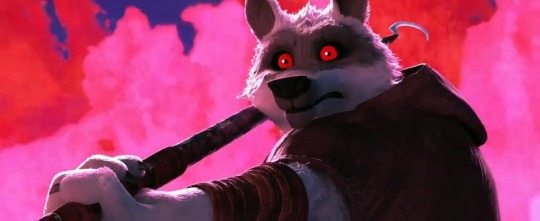
And he's also a perky goth but none of you are ready for that conversation.
#100% sure that if Tumblr was a thing in the Shrekverse...#Death would have an account#puss in boots#puss in boots 2#pib#pib 2#pibtlw#pib the last wish#puss in boots the last wish#the last wish#death wolf#death the wolf#lobo muerte#pib lobo#puss in boots lobo#puss in boots wolf#pib wolf#pib death#puss in boots death#puss in boots analysis#character analysis#escapism#creativity#shrek#dreamworks shrek#dreamworks#this is probably the discovery of the decade#or the stupidest thing I ever wrote on this website
3K notes
·
View notes
Note
So. Hear 5. Nika. Loony Tunes Luffy, if you will. Tell us your thoughts on him and any potential meta? 👀 I’ve been aching to hear it from you since we first saw him go Full Silly Boy.
it's hard to answer this, because i have so many thoughts. i'm just going to try and start from the biggest points and move down.
i like gear five a lot, and i think this development feels very appropriate as a culmination of both luffy's character and the themes of one piece as a whole because of how it interacts with three extremely dominant motifs that have reoccurred throughout the story: freedom, laughter, and the sun.
from the very beginning of the story, luffy has acted, in small ways and big, as an agent of complete freedom. from his first meeting with coby to his breakout at impel down to the liberation of wano, what luffy does is destroy systems that control and oppress, if only because they are in his way. every strawhat is somehow trapped and held back from pursuing their own dreams when they meet luffy, and he frees them all, along with hundreds of others along the way, whether he's inspiring shirahoshi to venture outside or crushing yamato's manacles. his talent for this has always seemed almost preternatural.
luffy is not necessarily a benevolent person; he doesn't care much about helping people in the abstract. he's selfish. he values freedom for freedom's own sake, not because of any greater moral convictions. he doesn't think much about the negative knock-on effects of things like causing a mass breakout at impel down, and he doesn't really go around seeking out downtrodden and oppressed people to free out of a charitable or selfless instinct, nor does he really do anything because it's the right thing to do. he's dismissive of the idea that he might be a hero.
but because he is a completely uncontrollable free agent, and he doesn't really want anything but for himself and everyone he cares about to be completely free, he constantly collides with the systems of oppression that control his world, and when those collisions happen, it is the systems that fail, time and time again, because oppressive systems always do eventually. they can't withstand the light of day. and because he lives completely confidently and unapologetically, he is constantly inspiring others to do the same.
so by the time we are told about nika for the first time, we already know that what nika is said to do is what we've seen luffy doing for more than a thousand chapters: he frees people, and inspires them, and makes them laugh.
i also find luffy-as-nika to be very interesting and thematically appropriate when positioned in opposition to the various antagonists in one piece who have declared themselves to be gods, frequently some of its most tyrannical and oppressive villains- enel, the celestial dragons, doflamingo. all enslave and imprison people, robbing them of their freedom.
nika is a god of slaves, and a creature of liberation. the natural enemy, as rosinante might say, of that sort of megalomaniacal 'god.'
one piece has also consistently connected the theme of freedom, as embodied through luffy, with the sun since very early on. the sun pirates, former slaves, used the symbol of the sun to wipe away the brand of the celestial dragons. (and aren't i curious to know what jinbei might know about nika- he never did answer who's who's question about it.) the fishmen more broadly view the sun as something to be reached when they are truly free. on wano, the coming dawn is understood as the coming liberation. impel down and the florian triangle, places of indefinite imprisonment, are lightless dungeons where the sun doesn't reach. the sun is freedom.
and luffy has always been thoroughly sun associated, from the visual of his hat to his origin on dawn island in the east blue, to his ship, the thousand sunny.
finally, one piece has always placed a great deal of emphasis on smiles and laughter (laugh tale, joy boy, roger laughed, etc)- but that joy must be real. it can't be forced. we're told again and again, through koala, dressrosa's toys, and most obviously the victims of the failed SMILE fruits, that to force someone to smile, denying them the right to cry, is nothing less than an atrocity. people can't be forced to be happy- they should be happy because they're free.
luffy in gear five is laughing nigh-constantly, but it's just because he's having so much fun. unlike the victims of the SMILE fruits, his endless joy is genuine, because in this form, he is completely free- nobody can stop him, and nobody can control him. as he says himself, he can do whatever he wants.
i know that some people felt this moment was in some way a deus ex machina, but it just didn't feel that way to me, because of how well it plays on the story's established themes and trajectory, as well as concepts like devil fruit awakening having been established hundreds of chapters back.
luffy is the sun, the sun is freedom, freedom is joy. i think it makes total sense.
#one piece#jonny answers#op#opmeta#luffy#gear 5#character meta#long post#what are my thoughts on gear 5 you ask. this isnt even all of them.#sun god nika
420 notes
·
View notes
Text
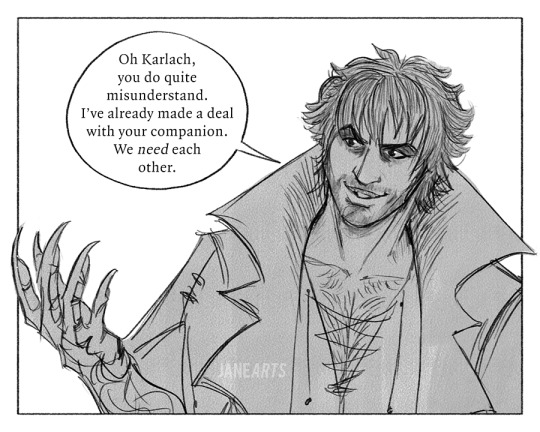
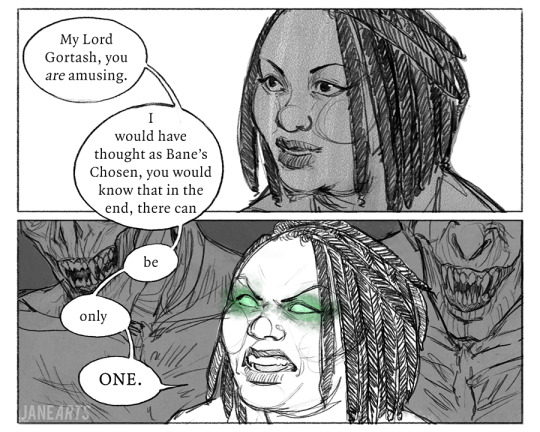
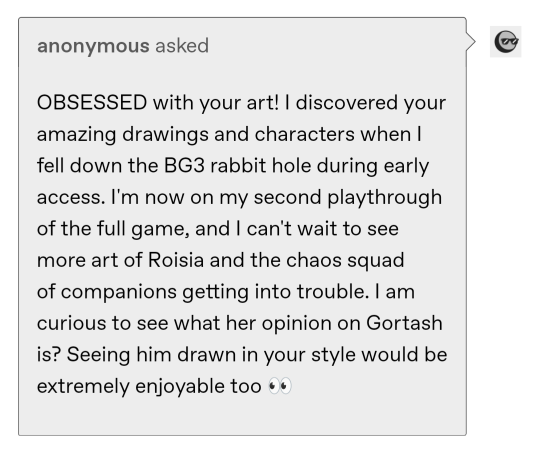
I couldn't help myself from referencing Highlander. There can be only one [wielder of the Netherstones]!
Proper answer (and some character analysis for Roisia) under the read-more.
Roisia was surprised by Gortash, but pleasantly so. In the first place, as far as Roisia is concerned, Ketheric and Orin recall their respective gods in their appearance: Ketheric is withered, a husk of a person, but indomitable, and Orin... well, Orin looks like a flayed corpse with meat-suit clothes, but close enough. Roisia would have expected Bane's Chosen to be more... physically domineering. Terrifying. Intractable. ...Loud? Instead, here's this charming handsome fellow who is really rather ordinary. If Roisia met him on the street, he'd just be another debonair noble lusting for power. (Join the feckin' queue!)
And neither does Gortash behave as Roisia would have expected Bane's Chosen to behave. She would have expected a Banite to be a tyrant, a Faerûnian-version of the Machiavellian prince, who instils a terror of himself and who rules through fear. Instead, Gortash gently curates among the populace not a fear of him, but a xenophobic fear of The Outsider (whether that outsider is a cult like the Absolute or a group of people like the Coast's refugees).
Roisia—by all accounts an oppositional force to his own—encounters a man who is genuinely, fully, confidently willing to partner with her to achieve a common goal and is willing to swear a divine oath to secure that partnership...
Poor man. What a fool.
You see, Roisia is something of a Machiavellian prince. She would despise to think of herself in that way were she to read Il Principe, but she has within herself some (but not all!) of the traits and qualities that are described within. She is frequently a mirror: where she meets evil, she wields evil with aplomb. ("You desire me to kiss your foot? I think not. You shall kiss mine.") She would very much prefer to offer mercy, but if her mercy is rejected—like when Ketheric imprisons Dame Aylin once again before yeeting himself into the primordial soup—then she will dole out cruelty in equal measure. Most importantly of all, Roisia is a liar and a deceiver, all while appearing compassionate, guileless, and true to her word. Roisia only really keeps her word when it suits her purposes. Were she otherwise, she would have found that Gortash would have been faithful to his word to the last. But as the Machiavellian prince, she betrays and slays him.
Actually, having written all that, Roisia is more of an embodiment of the Machiavellian prince than I originally thought: she is virtuous and good, sure, but she is also intimately familiar with baser behaviours (lying, cruelty, conspiracy, etc.) and wields those base behaviours like a tool when and where she feels it is needed and necessary.
Which is why I was absolutely thrilled when I had her do what was only natural to her and had her speak to Gortash post-mortem. Roisia is a character who believes herself to be godless: damned and/or abandoned by Kelemvor, Lord of the Dead and Judge of the Damned, for being a Necromancer. She had a sliver of hope that she would find favour with Myrkul, but Myrkul thought only of the Chosen stolen from him. She thought, perhaps, that she might find favour with Bhaal because, let's face it, she had slaughtered and bloodied so many in her long journey to Baldur's Gate, but the skull only wept blood and that was that. Bane, however, actually speaks to her, acknowledges her, validates her. She won his favour the moment she betrayed and slayed Gortash. She is in her very nature a stellar Banite. Incredible! And absolutely absurd. Thank you to Larian for programming that opportunity in. 😂
#Baldur's Gate 3#BG3#BG3 Spoilers#Gortash#Enver Gortash#BG3 Roisia#Act III Spoilers#Roisiacanons#rosecanons#roisiacanons
895 notes
·
View notes
Text

Tzedek Tzedek Tirdof and Tikkun Olam
Long post, buckle up. I have Feelings.
This concept is something I've been turning over in my head for awhile and trying to get the composition right. So I guess a quick history lesson for people who don't know yet (though I feel like it's becoming common knowledge) the comic book industry exists because of Jewish people. DC, Marvel, and everything that came
after. Superman, Batman, Spider-Man, Captain America, and SO many others came from Jewish writers and artists. And try as people might, it is impossible to separate that from these characters. My roommates and I (three Jews and a goy, but like
a cool one) are specifically into DC and were talking a while back about the core ideas of Superman and Batman. And yeah, the first things that probably jump to most peoples' heads are maybe hope and fear, justice, maybe the American way or whatever is happening in New Jersey. And yeah, to an extent I think that's right
but it's not the whole story. See, what seems clear to us is that Superman and Batman specifically embody two Jewish principles: Tikkun Olam and Tzedek Tzedek Tirdof. A quick-ish and simplified explanation:
Tikkun Olam (Superman) is at the heart of Judaism. It means repairing the world, and while there is a more complex religious and ritualistic meaning, the broad takeaway is that it is our job to make the world a better place. You can't save the world but you have to try. It's hope. While the light is shattered it can be repaired and it is our duty to do what we can, to put good out into the world no matter how large or small. What matters is that you try, you always
try.
Tzedek Tzedek Tirdof: Justice, Justice you shall Pursue! (Batman) Another core of Judaism. Tzedek Tzedek Tirdof is not merely the pursuit of justice, but justice for those who need it most. The most vulnerable, the people at the greatest disadvantage, that continue to be hurt the most.
And when Superman and Batman are being written well, written correctly they embody these ideas. These characters and their stories where not created in a vacuum, nothing is. They where made by Jewish men, sons of immigrants. Their ideas of the world and
concepts of justice would be inherently Jewish. Tikkun Olam and Tzedek Tzedek Tirdof are the definition of justice and making a better world for Jewish people. These characters and the stories they tell and the ideas they exemplify are and always have been at their heart Jewish. Try as some people might you can't take that away, it is sown into their creation whether you know it or not. We won't be removed from our own narratives.
#dc comics#superman#batman#kal el#bruce wayne#clark kent#kal el is NOT a jesus allegory#he's clearly a moses allegory#judaism#digital art
784 notes
·
View notes
Text
every time someone says "an should have been vbs's leader" or "saki should have been leo/need's leader" i want to . slam my head through concrete. oh you missed the point so bad
1. the "leader" thing is kind of really fucking insignificant outside of where each group's story begins and promo materials. it doesn't mean one character is the "main character" of the group. project sekai doesn't HAVE a main character in the first place it's not that kind of story. each individual character is equally important to not only their group's story but the over-arching story of the whole game
2. leo/need's story begins with ichika because she is ultimately the one that brings them all back together. not saki. it is ichika's determination and frankly stubbornness that gets through to shiho and honami. like, saki was literally ready to give up on reconnecting with honami! (out of love and respect for her choices but like) if she was the focus leo/need would have been honami-less!! but ichika refuses to let it go. much like she refused to let go of their friendships throughout all of middle school.
when the story begins, we see ichika burnt out and hopeless. but that's only after years of trying and trying and trying and trying again to reconnect with shiho and later honami. this fandom does not understand ichika's character well . she's not meek and she doesn't back down easily she's not some like... fumbling "girlflop" she's incredibly driven and strong-willed. she lost some of that due to depression and isolation but as of leo/need's most recent arc ender she has pretty much regained her fiery spirit. she's leo/need's lead singer and MC for a reason
3. vivid bad squad's story opens with kohane because she's the only one who hasn't grown up/partially grown up on vivid street. if an or akito had been the "leader" we would have lost the magic of getting to know vivid street and its people and unique culture. it's all average every day life for them, but kohane is experiencing it all for the first time. it's only through her eyes that the audience can understand just how very special vivid street is
4. one more thing: you could say that the "leaders" represent the themes of each group and the general direction of their story arcs. vivid bad squad, among several other things, is all about improvement and growth and overcoming challenges and creating something new and finding a place to call home within a community. who better to represent that but the socially anxious newbie who never felt like she belongs anywhere and would never do anything with her life?
leo/need is about love and the ability to endure all hardships and preserve that love . it's about having a heart big enough to hope for the impossible and the willpower to make it reality. ichika, in all her hard-headed stubborn painfully persistent glory, is perfect for that.
similarly, mafuyu isn't nightcord's leader because nightcord is ultimately about healing. hope. finding a way to make life worth living again. these aren't paths he would have chosen on his own. he gave up on himself a long time ago. as did ena and mizuki, in their own ways. the best person to represent hope is the one who refuses to give up on anyone and stubbornly believes she can save them all
wonderlands x showtime is about moving forward to a brighter future and not letting the past keep you shackled in place. it's also about having lofty dreams and the selfishness to pursue those dreams. both of these things are why emu Isn't wxs's leader; she lacks that selfishness (i'm not using this word in a negative sense btw; i think being selfish can be a good thing. and sometimes being selfless is a bad one) tsukasa (and rui) has, and she often clings to the past.
and as far as more more jump and all their own themes of hope and never giving up go, of course their leader has to be minori. she brought three disillusioned, jaded ex-idols hope and reignited their passion! she's the walking embodiment of hope itself
609 notes
·
View notes
Text
I love how the power levels of Sandman obscure just how insanely powerful Hob actually is.
Like, most of the normal people in the Sandman world have no idea that any of this cosmic stuff is happening. Then you've got the Endless: massively powerful cosmic entities that literally embody metaphysical concepts. Then you've got your rogues gallery of Dreams and Nightmares, most of whom don't interact directly with the human world, those that do basically turn the world of the humans they interact with upside down. Rose Walker straddles the line between normal human and insanely powerful force of nature but again, only a few other normal humans even know of her existence.
So in this crazy landscape of insanely high peaks of power but which, realistically, make up some .000000001% of what anyone on the world is directly aware of, it's easy to forget the weird place Hob occupies.
Despite being arguably the best friend of one of the seven cosmic metaphysical entities that govern a chunk of this universe, he has no idea who Dream is. As far as he knows, Dream might be a minor demon or sorcerer. Heck, he might be a local ghost haunting the White Horse Tavern, for all Hob really knows. Hob is adjacent to Dream though and he has no idea that Dream tangled with Lucifer, or stopped John Dee, or controls the dreams of everyone alive, OR that Hob is possibly still alive only because of a wager between Death and Dream. He is that close to those events, and yet totally disconnected ffrom them, as are all but about six people on Earth.
Conversely, if you never met one of these insanely powerful cosmic entities or humans empowered by their devices like John Dee, Hob Gadling would be the most insanely powerful being you've ever met. He can't die. In just about any other story, that power alone makes him a minor deity.
And yet, in the relationship between Dream and Hob, Hob is the normal everyman type with this guy! Hob is the grounded, low-power one by comparison but it's such a nutty comparison because, for anyone else besides an actual beyond divine being, Hob would be the supernatural immortal entity in the relationship, like a vampire or a god or something.
I don't know, I'm just tickled by the fact that Dream is so insanely powerful in this otherwise low-power world that the indestructible immortal character looks like his cozy little boy-next-door boyfriend.
4K notes
·
View notes
Note
Hi! Do you think Alastor and Lucifer are foils?
Hi!
Yes, of course they are!

Alastor and Lucifer's foiling starts in Dad Beats Dad (obviously), where they fight over Charlie's affection. They might seem as opposites throughout the episode, but they are actually the same, as they both try to impress Charlie with their powers:
[ALASTOR:]
They say, when you're looking for assistance
It's smart to pick the path of least resistance
[LUCIFER:]
Others say, that in your needy hour
There's no substitute for pure angelic power!
Still, Charlie doesn't care and all she wants is for her parental figures to support her:
Charlie: How come he can have faith in me, but my own father can't?
In short, Alastor and Lucifer find pride in their abilities, but need to let go of it, in order to show their love for Charlie. By the end of the episode, they both accomplish this. However, they succeed in slightly different ways, that fit their shared motif of shadow and light. In particular:
Alastor is linked to shadows, as his abilities let him manipulate shadows
Lucifer is linked to light, as his name means morningstar and his powers manifest in light-beams
As a result:
Alastor's development happens in the shadows, whereas Lucifer's in the light - This is true also on a meta-level, as Alastor's arc is the secondary plot-line of the episode, whereas Lucifer's is the main one
Alastor acts as Lucifer's jungian shadow and becomes a catalyst for him to change. Similarly, Alastor himself is challenged to grow by his own jungian shadow, aka Husk
What is the jungian shadow? It is the repressed part of a person. In stories, a character might meet another one, who embodies this hidden part of the self. By integrating with the shadow, the character evolves. In other words, Alastor represents a repressed part of Lucifer and Husk a repressed part of Alastor. Let's see how it all plays out.
ALASTOR, HUSK AND MIMZY
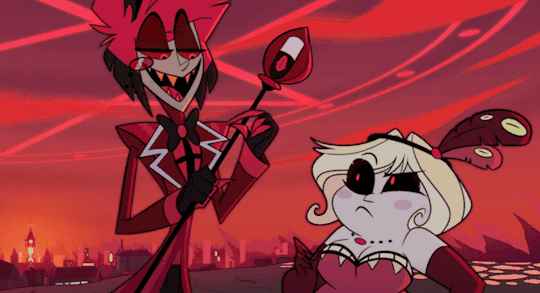
Alastor and Mimzy's bond is unhealthy, as they both enable negative sides of the other. On the one hand Alastor keeps covering for Mimzy, no matter what she does. On the other hand Mimzy feeds Alastor's ego by praising his power and abilities.
So, Mimzy never faces the consequences of her actions:
Mimzy: Thanks for helpin' lil' old me out of a though spot. You're always such a pal.
And Alastor feels respected and appreciated:
Alastor: It's nothing I can't handle. Don't worry Husker. Who in their right mind would cross me?
However, the reality is that Mimzy is using Alastor and Husk points this out:
Husk: You and I both know Mimzy only shows up, when she needs something. That bitch is trouble and who knows what kinda demon she fucked with to come running to you this time?
Not only that, but he openly calls Alastor out on his pride:
Husk: Big talk for someone, who's also on a leash.
Which results in Alastor reacting in anger:

That said, Husk is proven right. It turns out Mimzy has willingly brought chaos to the hotel, so that Alastor could solve things for her. Because of this, Alastor finally cuts ties with her:
Alastor: You deliberately brought danger to this place just to have me clean up your mess. I can't have that here.
This choice is important and it shows how the people around him are slowly impacting Alastor. On the one hand the Radio Demon listens to one of his subjects' advice. On the other hand he acts to protect the hotel. As a matter of fact the moment Alastor steps up as the Host of the Hotel isn't when he sings to Charlie in Hell's Greatest Dad nor when he transforms into a giant and fights. It is when he sends Mimzy away and sacrifices a little bit of his pride to do so. interestingly, this happens as nobody is looking at him, so he isn't really trying to impress nor to trick the others. He acts selflessly in the shadows.
LUCIFER, ALASTOR AND CHARLIE

Lucifer and Charlie's bond is strained:
Charlie: We just have never been close. After he and mom split, he never really wanted to see me. He calls... sometimes, but only if he's bored or like, needs me to do something.
At the root of this conflict there is Lucifer's inability to show his daughter how much he cares. He struggles to express his feelings and hides them behind a prideful persona:
Charlie: I told you when you called me five months ago. Or did you not listen?
Lucifer: No, no, no, no. Just, you know, I just forgot. I've just been really busy, ya know with um... important things.
Instead of openly admitting his depression and sadness he prefers to look cold and uninterested. Even dismissive and condescending, like when he arrives at the Hazbin Hotel:
Lucifer: Wow, this place sure looks, uh... Uh-uh. Yeah. Uh-uh. It's got a lot of character!
Lucifer is initially too focused on what he cares about - meeting his daughter - rather than on what Charlie wants - for him to help her with the hotel. He happily hugs Charlie and then immediately moves on to pet Keekee, Razzle and Dazzle, who are his own creations. Only later he considers the welcome Charlie and the others have prepared for him. Even then, he still misses the point and tries to buy Charlie's love by showing off his magical powers:

Haha, looks like you could use some help
From the big boss of Hell himself
Except that what Charlie wants from him aren't champaigne fountains or caviar mountains, but an appointment with Heaven, which he negates her. Not only that, but instead of being honest about his fears, he deflects everything on Charlie herself, by dismissing her plan:
Lucifer: Alright, listen, I love that you want to see the best in people, but these sinners... You know, they're just the worst. I, I don't know how much you can realistically expect from them in Heaven.
Luckily, the Radio Demon is closeby, as he forces Lucifer to show his true self.
On the one hand Alastor brings out Lucifer's insecurity and fears:
I'm truly honored that we've built such a bond
You're like the child that I wish that I had
I care for you, just like a daughter I spawned
It's a little funny, you could almost call me dad
He juxtaposes moments of everyday life and affirmations of affection to Lucifer's materialistic and fancy promises. In this way Alastor highlights the faults of Lucifer, as a father. He points out that Lucifer is never there for Charlie.
On the other hand Alastor embodies the kind of sinner Lucifer despises:
Lucifer: Ya see? What I tell ya? Charlie, sinners are violent psychopaths, hell bent on causing as much pain and destruction as they can. There's really no point in trying.
And yet, such a violent psychopath is more willing to help Charlie than Lucifer himself:
Charlie: Dad, stop! He's defending this hotel. It may be a bit more sadistic than I'd hoped. But he's doing it for me!
This realization leads to a confrontation between father and daughter and to an admission on Lucifer's part:
Lucifer: I just don't want you to be crushed by them like... like I was.
The problem isn't Charlie, but Lucifer himself. It is not that Charlie's dream is silly, but that Lucifer's one has been destroyed. This revelation is important because Lucifer's mask comes off and he shows Charlie his weakest and most broken self. He swallows his pride and has Charlie see who her father really his. In all his mistakes and his hurt. And to his surprise Charlie accepts him. Not only that, but she admires him:
So in the end, it's the view I had of you
That showed me dreams can be worth fighting for
Symbolically the song More than Anything starts with Lucifer and Charlie in the shadows:
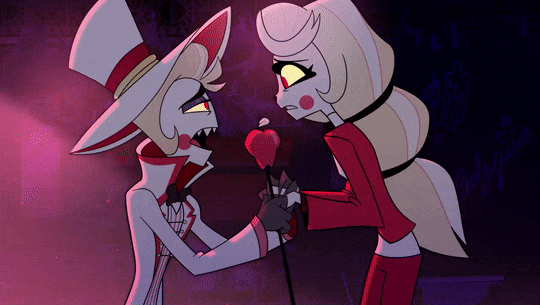
They are repressing a lot and have no idea who the other is. Still, as the song goes on, they get to understand each other:

All that I'm hopin', now that my eyes are open
Is that we can start again, not be pulled apart again
'Cause in the end, you are part of who I am
And they end the song surrounded by light:
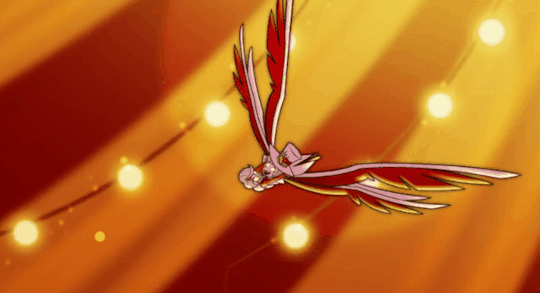
What is initially in the shadow comes to light in three different ways:
Lucifer shows Charlie his true self
Lucifer sees Charlie for who she is
Lucifer exhibits his weakness in front of the whole Hazbin Hotel. He lets the sinners he dislikes so much witness the mess that he is.
His fragility is in full display. It is in the light for everyone to see.
PHENOMENAL COSMIC POWERS! ITTY BITTY LIVING SPACE!

Another similarity Alastor and Lucifer share is that they are two powerful beings that give much importance to free will:
Alastor: You should know better than anyone what a soul can accomplish when they take charge of their own fate.
Charlie: Together, they wished to share the magic of free will with humanity.
And yet, they are both trapped:
Alastor: I'm hungry for freedom like never before
The constraints of my deal surely have a backdoor
Once I figure out how to unclip my wings
Guess who will be pulling all the strings?
Charlie: As punishment for their reckless act, Heaven cast Lucifer and his love into the dark pit he had created, never allowing him to see the good that came from humanity, only the cruel and the wicked.
On the one hand Alastor controls many souls, but his own is owned by someone else. On the other hand Lucifer is the strongest being in all of Hell, but he is regarded as a disgrace by other angels.
Moreover, they both project their unhappiness on others. Specifically, Lucifer blames sinners like Alastor:
Lucifer: Our "people", Charlie, are awful! They got gifted free will and look what they did with it! Everything's terrible!
While Alastor lashes out on his prisoners, like Husk:
Alastor: If you ever say that again, I will tear your soul apart and broadcast your screams for every other disrespectful wretch who dares to question me.
Still, the point is that Lucifer is exactly like Alastor. He is a gifted creature, who messed up royally and cursed humanity. Alastor instead is exactly like Husk, a powerful overlord, who still finds himself chained. Lucifer is the most hated being in all of creation and Alastor is on a leash. They are both lonely and desperate, but too proud to admit it. In other words, they are both losers:
Husk: There was a time I thought no one could relate
To the gruesome ways in which I'm damaged
But lettin' walls down, it can sometimes set you straight!
We're all livin' in the same shit-sandwich
Just like everyone in Hell. And yet, this is not bad per se. Even if you hit rock bottom, you can still climb back up, as long as you let go of self-importance and start to earnestly empathize with others. As a matter of fact it is only through community and bonds that a person can be redeemed and heal:
Out for love
Love
Think of who you care about
Protect them and be out
For love
Love
You're gonna fight without gloves
Long as you're out for love
This is what Alastor and Lucifer are learning through Charlie.
TWO DADS, ONE DAUGHTER

Season 1 sets up Alastor and Lucifer as two mentor figures to Charlie. They share this role in a way, which makes them almost perfect mirrors. Some examples:
Lucifer gives Charlie the hotel building and Alastor calls it Hazbin Hotel
Alastor helps repair the Hotel in the beginning, while Lucifer assists Charlie in building it anew by the end
Lucifer guides Charlie to Heaven, as he sets up her meeting with Sera and Emily. Alastor instead guides Charlie in Hell as he introduces her to Rosie and helps her inspire the cannibals
Both Alastor and Lucifer believe in Charlie, when she is at her lowest. Alastor does so before the final battle, whereas Lucifer after the fight
Alastor and Lucifer fight Adam (another foil of theirs) in the final episode. Moreover, both belittle his abilities and highlight how he is strong, but unskilled:
Alastor: You lack discipline, control and worst, you are sloppy!
Lucifer: So, this is what you've been up to since Eden? Gotta say, you really let yourself go buddy.
In particular, Alastor is the one supposed to take Adam down, but fails and Lucifer steps in by the end. This is just like in the beginning Lucifer is supposed to support and help Charlie with her project. Still, he is absent and Alastor fills the spot.
In other words, Alastor and Lucifer are unwillingly complementary and so far one has appeared when the other has been incapacitated. We'll see if this pattern continues. As for now, they are clearly framed as key to Charlie's development, so it is possible they will come to embody different sides of her:
Alastor represents the sinners Charlie wants to reach and all their pain and complexity. He is also linked to fear and the unknown. He is the ally she finds by herself. He is the found family Charlie chooses.
Lucifer represents the angels Charlie wants to communicate with. He is also linked to dreams and ideals. He is the legacy she inherits. He is the biological family Charlie wants to re-connect with.
In short, they are both parts of who Charlie is and she needs them to grow into herself. Just like they need her to mature and find redemption and happiness.
#hazbin hotel#hazbin hotel meta#alastor#alastor hazbin hotel#lucifer morningstar#lucifer hazbin hotel#my meta#asksfullofsugar#anonymous
206 notes
·
View notes
Text
skip to loafer chapter 60 analysis and brief character study on shima // spoilers
a light and fun chapter that hides something between the lines: how frankenstein's loneliness and revolt becomes a mirror for shima's feelings
(since the translation is very fresh, very very close to the release of the chapter, i will try to use the raws more. this is a way to make you curious to read the translation and also to support sensei in a way! hope you guys understand)

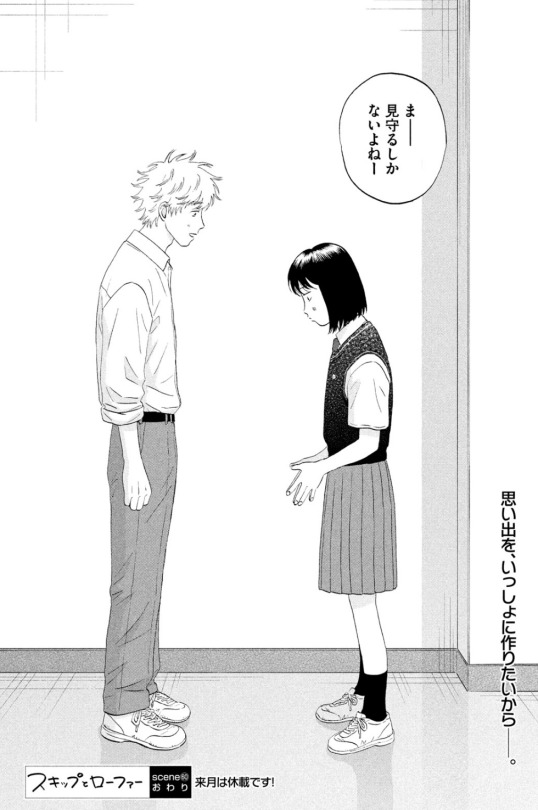
it's actually funny how much i'm surprised by every skip to loafer chapter. of course, some things i feel were expected to happen, but others appear suddenly and drive me completely crazy — that's the gift of takamatsu, who’s able to have fun with her own characters to the point of unfolding a delicate writing, that's much deeper than it appears to be.
i think it's cute and fun how shima's jealousy starts to be used as a comic relief in the story. it's something very innocent, which doesn't harm either party, but rather makes something new bubble up inside him, a feeling he wasn't familiar with before. he knows how it hurts to see mitsumi with other people and how he wants to be close to her, but he still doesn't have the necessary repertoire to express exactly what he feels.
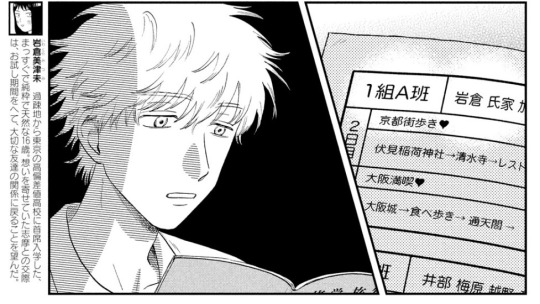

and then, to add an additional element to the plot, sensei chooses frankenstein as the play for the school festival, shima's second great performance. she chooses a story of loneliness and desire, of a monster made of scraps of other people who tirelessly seeks his space in the world while being denied by his own creator — doesn't that sound a little familiar to you?
shima is, whether we like it or not, a fragment of other people's expectations. he is everything his mother wanted him to be, but also his broken expectations. he’s also made up of all the desires he represses and the times he was used by people as an object to be displayed. shima is a monster made of other people's expectations who seeks in other people's warmth a way to find a cure for his own loneliness.
and this ends up being even more explicit when he shows that he is truly happy and fulfilled when acting in the play. for the first time, he's not doing this for his mother or any adult's validation: he's doing it in the name of himself, his wants and his own way. he is slowly making peace with acting and his complex feelings surrounding it.
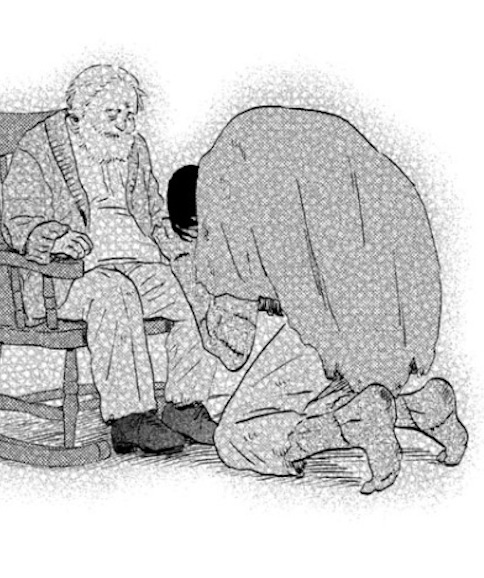
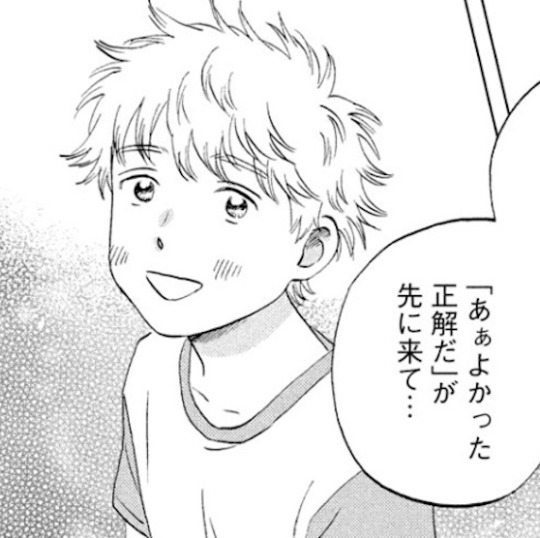
but, like it or not, shima still hasn't gotten rid of all his traumas, and this becomes slightly clear when sensei chooses to make a game with the lines of two different characters: shima and his internal monologue versus ujiie, a person who has slowly been causing him some complex feelings.
"i thought to myself it would be nice if i could perform this role better than anyone else" followed by "isn't that the bare minimum?". it's as if ujiie, unintentionally and through no fault of his own, was embodying a mixture of shima's personal ghosts and all the expectations that were thrown at him throughout his life.
isn't that the bare minimum? you've lived your whole life playing the role of someone who wasn't you, of a puppet. so...isn't that the least you could do? facing the scientist who created the monster, wouldn't that be a way of being able to face everything that was built in its place?
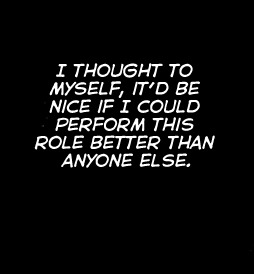

i think it's beautiful the way that sensei plays between shima's old feelings and these new ones that he's been discovering little by little. yes, he is finding happiness in acting again, finding his space in the world, but he is also developing a new feeling that he has never felt for anyone before. seeing mitsumi surrounded by so many other people gives him a somewhat irritating itch, which he himself doesn't know how to resolve — after all, he's a teenager, no teenager really knows how to resolve such complex feelings.
this makes him expose his neediness. seeing mitsumi, the girl he likes so much, surrounded by people who aren't him, makes him act like a needy teenager who doesn't know how to ask for attention.
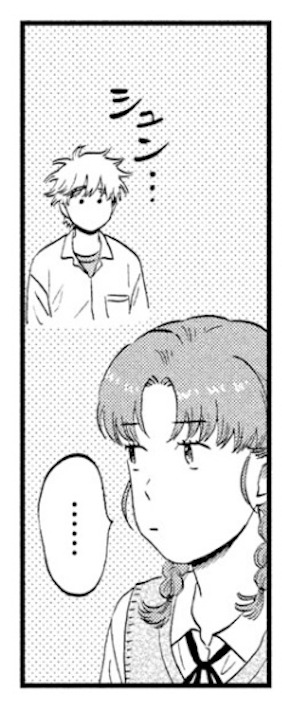
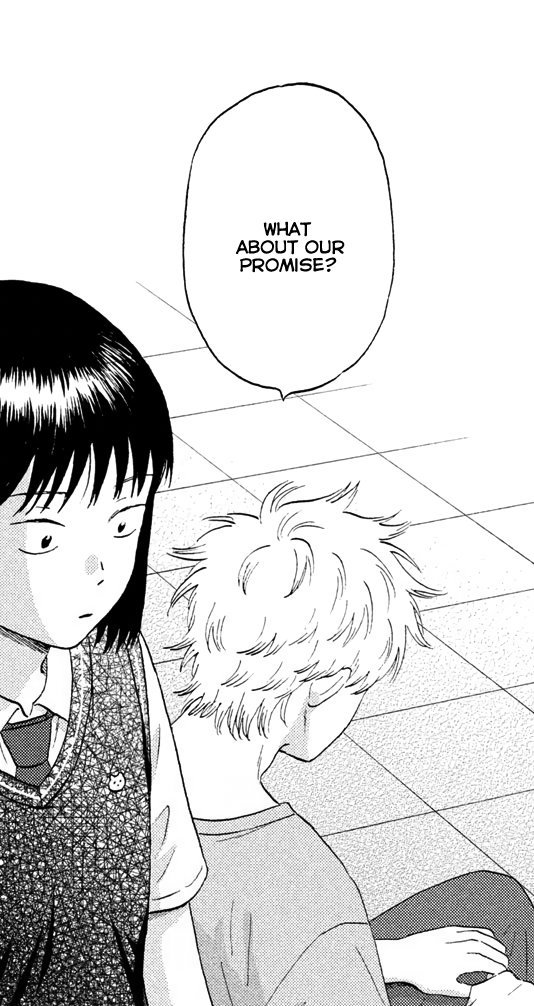
different from what the girls thought at first, i don't think shima tried, in any way, to manipulate mitsumi. i really agree with yasaka on this part and i'll add even more: i believe that even he doesn't really know what he's doing. not even he knows exactly how he feels about mitsumi. but what he feels, at the moment, is an enormous desire to be with her and have her all to himself. he just needs to find a way to express his feelings in a clearer and more rational way (but i think that will take a while). It’s almost like the monster on his journey to find his beloved.
now about the other parts of the chapter: seeing the girls come together to discuss something that mitsumi was so afraid to tell before makes my heart fill with joy. seeing a group of girls so unique, so concerned about each other and so comfortable opening their hearts to each other makes me happy in a surreal way. i love, love, love the way in which sensei develops their friendship and how she always, always tries to show how much the girls are willing to help mitsumi even without knowing exactly how.
reading "yeah, none of us have that much experience with dating" is so cute to me. they are teenagers, they are also, for the first time, facing a wave of new feelings, new challenges — and the great luck is that they have each other to support and seek help.
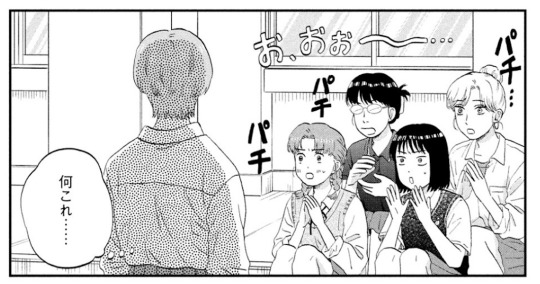
i'm also very happy how yazaka is, little by little, gaining new friends and opening up more. i confess that in the past i didn't know exactly how to interpret her character, but now i want her to get more and more involved with girls. she deserves to have a group of friends who count on her to express doubts and seek help, just as she also needs that same support system.
well, as the girls said "all we can do is watch over them" and that's exactly all we can do too. i believe that this journey of self-discovery, for both shima and mitsumi, still has a long way to go and i think this is extremely special. this just shows how much they both love each other as people and are willing to try to meet each other halfway so that all their feelings are equalized.
once again, we have an amazing chapter in our hands. sensei keeps getting better and better, surprising us every damn time. i'm just so happy to be able to read such beautiful story and lucky to experience all of this. we're so damn lucky. remember: please support sensei if you can, by buying the chapters (via comic days or the online version of the magazine or the volumes). thank you SO MUCH for reading!! will love to discuss more with you all 💛
#skip to loafer#skip and loafer#skip to loafer chapter 60#skip to loafer spoiler#skip and loafer spoilers#stl spoilers#A SHIMA CHAPTER IS A ME CHAPTER#I COULD ANALYZE THE SHIT OUT OF HIM FOR DAYS#MY BABY MY SON#I LOVE HIM SM#AND I LOVE FEMALE FRIENDSHIP SO MUCH#TAKAMATSU THE GENIUS YOU ARE#duckmetas
158 notes
·
View notes
Note
Omg I love your makima reader!!! But like what if there was Denji reader👁👁
Like reader is like easy to fall in love with everyone and all that and having Chainsaw abilities just by her heart, and doing basically what denji have done, now that denji reader is in hell what happens when the ey meet the whole characters at the hotel
I see user don’t know lucifer since reader thought hell was actually the hell they went to (let’s call it purgatory where all embodiments of fear lives) but they’re In hell where lucifer rules, what are the characters first thoughts about denji reader
Keep up the good work on ur fics!!🫶🏽🫶🏽
Take some breaks and drink some water🫶🏽🫶🏽
Thanks anon for this amazing idea! And your sweet message 💕 ~
Eh? | Various x Denji!Reader
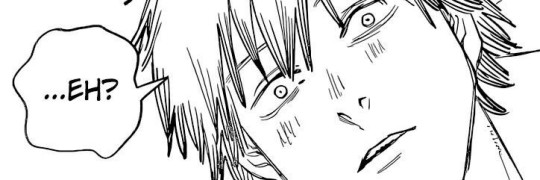
After dying (finally do you know how much power it takes to kill the chainsaw man?) You end up waking up in a place that resembles a city. A very dirty and bloody one.
Of course you are confused, this cant be hell, hell has lots of doors and its all dark. So what is this? A demon power? A travel to another universe?
Whatever it is you dont care, seeing that you still have your powers its enough. Also, being back to having to steal to survive feels like nothing.
Turns out people here give zero shit towards any type of law violation so of course you end using your powers to attack and defend yourself.
Why are you picking up a pig and why a Demon who looks like a spider its coming towards you?
Angel its a lost of words as you give his little friend back, your body all covered in blood and the chains coming from your arms not suprising him.
More the fact that you look like a lost puppy as you ask what this place is and why he looks like a spider.
~☆~☆~☆
Angel its quick to flirt with you, getting you all flustered and confused. You think you are in love as he takes you back to the hotel.
Thats till you meet Husk who could not care less about you but now has to deal with you asking for drinks and seeing your pathetic attemp to flirt.
~☆~☆~☆
Once Charlie meets you and does break the news to you, you are lose in words...then she offers you to stay for free and have food as long as you dont cause trouble.
Its paradise to you.
~☆~☆~☆
Alastor thinks you are stupid but likes to see you do something and fail, he takes note on how the smallest things brings you joy. The first time he saw you fightning he was suprised to say the least.
~☆~☆~☆
Oh and when you meet Lucifer.
"I thought you would be scarier than Darkness demon was worse...and taller"
Lucifer its now questioning why he is so short and why you were talking to him only to end chasing off one spider.
~☆~☆~☆
You would end being a overlord without knowing you are one. The "meetings" seems more like friends gathering together. The other overlords cant take you seriously at all.
Its thanks to Rosie and Alastor that you end staying during the meetings even if you fall sleep most times.
~☆~☆~
160 notes
·
View notes
Text
🐇Welcome to Wonderland- Pick a Card
Who from Alice in wonderland do you embody? And what's something good about you.
Pandorasworkshop
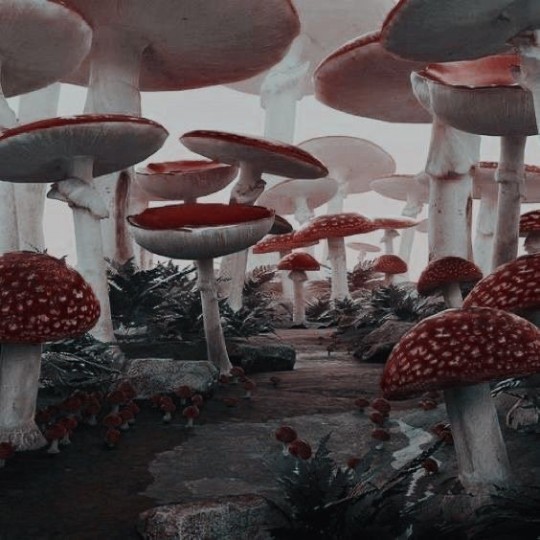
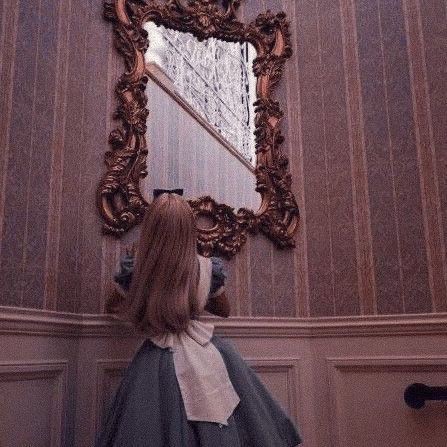
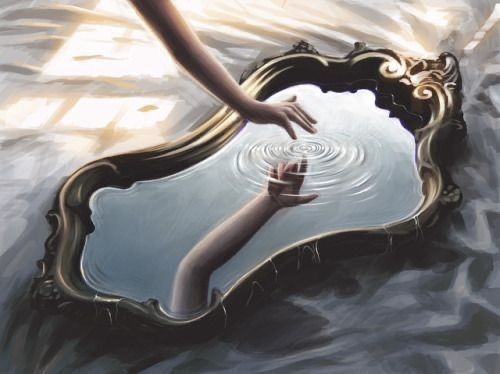
Pile 1 Pile 2 Pile 3

Pile 1
Cards: the muses, the trout and lilly of the valley, the hare, three of cups and the sun
Character: white rabbit, door mouse, the march hare
Reading: You know how to have fun but I feel as if there is a little bit of social anxiety. May be a bit sleepy and have a pure heart. You genuinely mean well for your friends and are a go with the flow type of person. Creative talents and self expression is important to you. You are a good learner and work hard you should slow down sometimes when you feel stressed. I feel like you may be pretty like a bunny. With the sun card people view you as honest and bright. You may have a bit of a sweet tooth or have a signature drink you always drink. With the hare card I feel like you are a messenger and may warn people about things they need to know. You are smart and know how to get yourself out of a sticky situation. Rewrite any doubts about yourself.
Signs: 113, white rabbits or any rabbits for that matter, the feeling you have been forgetting something, card games, tweed fabric, academic style, vampire movies, peonies and white roses, the chess cookies that are square.

Pile 2
Cards: the storyteller, the sailor, coyote and datura, the moth and eucalyptus, the fool and six of cups
Character: Cheshire cat, the caterpillar, and Alice
Reading: You are a great storyteller and may get into a bit of mischief. You have a lot of wisdom that comes from living life and feel like people don't give you enough credit for that. You may be a little bit of a rebel but you know how to throw a party and get into fun. You may smoke or drink and if you don't you may be an avid tea drinker. You always know something before others do and have keen sixth sense and great observations skills. You may be neurodivergent or think a little differently about life than others. You have a child-like sense of humor and find things to laugh at. Joyous to be around. You are always down for something new and consistency may be a problem for you. You like to experiment in your tastes whether it's style, food and anything in between. You like to go to new places and experience life for all the nice things it has. You are curious about life and like to learn new things. Maybe school wasn't for you.
Signs: 444, blue butterfly, cats, fur coats, swords, beautiful crystals, responsibilities, feeling bored, caviar or any other types of fancy fish, silver jewelry, mushrooms.

Pile 3
Cards: the tailor, the herald, the horse and blue bells, beaver and birch, king of cups, queen of wands, ten of wands
Characters: mad hatter and queen of hearts
Reading: You are a hard worker and leader. Both of these characters lead. You may feel burnt out and need to rest. You are a person of many talents and skills. You are humble about yourself and may be a bit of a queen bee unknowingly. You have great fashion sense and are responsible. You may have struggled with depression. You are a survivor and have a lot of strength in you. Many people would say you feel like home and you are good at comforting your friends. No one knows what your next move is and you keep people on your toes. You'll always land on your feet like a cat. People feel safe around you and you have a lot of advice to share. I feel like you need to rest. You deserve a proper vacation or spa day. Whatever will make you happiest. Remember you come first.
Signs: 1111, red wine, apples, learning to accept help, those warm knitted blankets, satin, the color red, community, dahlias, the game Alice madness returns, violin and piano, spirited away.
#witchblr#witchcraft#folk magic#spellwork#tarot reading#tarotcommunity#tarotblr#tarot cards#tarot#tarot pick a pile#tarot pac#pac#pick a card#pick a pile#pick a picture#alice in wonderland#wonderland#oracle
419 notes
·
View notes
Text
okay FIIIIIINE i'll throw my hat into the Goncharov ring
Been a while i've done a proper movie breakdown, may as well be this one.
Rather surprisingly (but perhaps not too surprisingly given the unexpected renaissance of things like the original Dracula and Breaking Bad on this website out of seemingly nowhere and with very little prompting), I'm seeing a lot of new people suddenly interested in Martin Scorsese's seminal film classic Goncharov, originally released in 1973. Obviously a movie like that doesn't make it coming up on 50 years without generating a lot of discussion about the different ways the movie resonates and why, but coming into it in 2022 there's been so much cultural cruft that's collected around Goncharov that (similar to stories like Fight Club and Scarface) it's a little hard to parse what it's actually about with all the mythologising that's gone on around the characters.
Those movies, in one way or another, are about portraying the downfall of their protagonists -- Fight Club's after ironically creating another system of control and dehumanisation and becoming what he sought to destroy, Scarface's after being consumed by the wealth and power he's amassed. A lot of people assume it's that kind of story, because aren't most well-loved movies? However, I think this is ironically an assumption made because of the genre of film it is. All the people that aren't going, "OMG Goncharov is so cool and badass and fucks bitches," are going, "WOW I can't believe Goncharov is a cautionary tale about power corrupting," and in the process people miss that Goncharov is first and foremost about loss, in all its different forms.
I'm both kind of surprised and frustrated people miss this, given how utterly pervasive the movie is with its clock symbolism -- it's the one thing everyone remembers about it, it was in all the tie-ins. I dunno, maybe that got funneled back into the theory where they're meant to reinforce how Goncharov is just a mortal man at the end of the day, which is fine I guess, but the movie overall becomes a lot clearer when you interpret it through the lens of, "These things are gone and you can never get them back; clocks don't go backwards."
One of the most fascinating things about the movie is how every character embodies a different kind of loss. I'm gonna ease into this and start not with Goncharov but with:
Rybak, who is usually associated with loss as we typically think of it, i.e. the loss of loved ones via death. This comes up all the time, either in his trust issues (why he's being such a prick at the wedding), in the card game (he never bothers to bet much money, knowing he's bad at poker, and still loses all the same). Rybak is terrified of loss, cannot manage it, and ultimately is punished by losing what few people he had left and then being spared by Lorenzo who deems him punished enough, and is forced to survive, to grapple with what his life is now without them.
Goncharov's is actually more subtle, and it's loss of small, insignificant things as a result of the larger losses he believes he's processed. This is something that's frequently contrasted against Rybak. The pawn shop going under is actually a microcosm of this whole thing. Goncharov anticipates that this is obviously going to lead to financial issues for him, plans accordingly to deal with this, and... it works! He's saved! Except that means card games can't be hosted at his place anymore, given it's burned to the ground. Does this matter, in the grand scheme of his life? No, of course not. Poker night still gets had all the same. But it is different now, and always will be. Little things like this continue to add up, until something as insignificant as a towel -- a towel that never should have been in his room, but Sofia is no longer there to drop off his laundry and chat with him -- is ultimately the final nail in a coffin built of insignificant splinters, each one an imperceptible change underneath the much more larger, noticeable story beats of things like grief.
Otto is the big obvious one I'm not gonna linger on: loss of his youth, moments in the past that he wants to redo but can't. Most people at least seem to have gotten this one.
(This is also what the clocks get associated with a lot, which again, doesn't NOT make sense but also if it were just for this one character that, while thematically important, was honestly just a side character with limited screentime and only two scenes, would they really be all over the movie before Otto's name is even mentioned?)
Sofia's a bit abstract, and is the loss of self -- of the familiar anchors we have to who we are, what we think our core principles are, our place in society, who we want to be to our loved ones -- and by the time she dies she is rendered utterly unrecognisable to herself, and is horrified by it. She grieves herself the same way Rybak grieves his wife (even gets a direct visual callback via the way her face is lit when she's burning Lorenzo's check). You see echoes of this in Goncharov as well, but while Sofia is grieving the person she used to be, Goncharov is grieving the world around him (even though really, it's the same world it always was -- time keeps ticking on, one second per second, and neither one of them can ever un-fire that gun).
Lorenzo, tragically, gradually loses his freedom (and maybe in a parallel world would actually be the protagonist of a movie where he chokes on his own hubris like everyone seems to think Goncharov is GRUMBLE GRUMBLE). As he comes into his own more and more by his family's legacy, he is afforded fewer and fewer options about what decisions he can even make. Arguably he was doomed from the start, but the further he clings to power as a means to freedom, the more it drives him to destroying everything he ever (thought he) cared about. The tragedy of his character, and what makes him a good villain, is that he can clearly see what he is doing to himself and he absolutely hates it (his walking out early at the wedding is a tacit admission of this), but his absolute refusal to accept loss, to accept grief and pain and all the awful shit that comes with the human condition, is what causes him to toss aside every out he has because if he has enough CONTROL over his situation, surely he will never have to lose anything ever again. But, really, he already has.
I dunno. Goncharov is one of those movies that is great, and everyone seems to realise it's great, but nobody ever really puts into words why, and that's how you get Fight Club fans lmao. And it sucks because the actual discussion around the movie beyond "it's another hubris story but REALLY GOOD guys" is so much more fascinating and a much more earnest emotional truth that just never gets talked about.
#goncharov#goncharov (1973)#martin scorsese#al pacino#robert di niro#gene hackman#harvey keitel#gaslight gatekeep goncharov
2K notes
·
View notes
Text
RW&RB MovieAlex vrs BookAlex: A Rant
I'm late to the party on Red, White, and Royal Blue for a dumb reason and now I'm obsessed with it. OMG I WAS SO WRONG.
I love the book. I love the movie. I also love the difference between them that I find myself obsessing over: the lack of June.
I love June. I'm also not mad that they removed her from the movie, because I honestly don't think they had the time to do her justice. The important thing is that when they removed her, they split her personality and scenes between Nora and Alex. And the result is fascinating.
Combining June with Alex gives us a calmer, more emotionally mature, competent version of Alex. He is definitely not the hot mess that BookAlex is. (Don't get me wrong here: BookAlex is my favorite character.) But now it's implied that MovieAlex is better at keeping his temper, handles his shit without being micromanaged, advocates for himself more, and I'm pretty sure the speech he gives is his own. Probably with help, but still. Also not having divorced parents means MovieAlex doesn't have BookAlex's abandonment issues. It's never said that his parents' relationship is perfect, but it's implied that he's had a stable family background. MovieAlex still has flaws and he's not Nora Levels of Competency, but he's definitely a lot more balanced. And this actually changes his relationship with Henry, just a little.
Namely in reference to my two favorite scenes:
1) Storming the Castle.
BookAlex is a ball of rage in this scene, and it's GLORIOUS. Yelling at the windows, aggressively dripping everywhere trying to ruin the rugs, making rude comments about Henry's ancestors. He is defiant. He yells, Henry yells back. It ends in tears, but there's a lot of anger.
MovieAlex by contrast is quieter, more hurt. He hardly yells at all. (I rewatched this scene like 20 times for Repeat to be sure.) He's determined, and he doesn't back down, but you get to see that split second of fear in his eyes that Henry is asking him to leave. There's a lot more emotion and tears in this version. It's ... sweeter isn't the right word. Bittersweet, maybe.
Downside: The lack of transition in the morning from the book. I miss Alex expecting to be dumped, and Henry realizing he doesn't want Phillip's life before deliberately making the choice to be with Alex. Also the comment on Alex's hair, which made me giggle.
2) The Museum Scene
I know a lot of people are disappointed with this scene, and I feel the need to argue about why it's brilliant the way it is.
In the book, they go to the museum because Henry has made his choice, and now he's showing one of his favorite places to Alex. He's the one who brings up the music. He chooses to fulfill his fantasy with Alex there, and he chooses to play a song that embodies the romanticism of their situation, about being in love and not being able to let anyone else know. Your Song.
In the movie, they go to the museum when Henry's still trying to decide if this is something he can have, and he's sharing a part of himself with Alex when he talks about his fantasy. Alex is the one who chooses to fufill it, so of course he chooses a different song. For him, it's a song about how easy it is to love Henry. I Can't Help Falling In Love With You.
I also love that they changed Henry giving the ring to Alex to Alex giving Henry his key in return. I love the symbolism of Alex keeping Henry's ring safe for him, of their two homes side by side. But I also love the idea of exchanging parts of themselves. I love that they have those pieces of each other when they're separated and the emails are exposed.
The book tells the story better overall because it has the time to, and the bickering and friendship between the boys is everything. The movie makes me melt over the flirting and affection between them. I can't pick one over the other because both versions of this story are wonderful.
But emotionally mature MovieAlex and how soft he is with Henry, making sure Henry's taken care of? I am WEAK for that.
#Doing this here instead of my author's notes#I have a lot of feelings about red white and royal blue okay?#movie versus book#both both is good#emotionally competent Alex FTW#red white and royal blue
246 notes
·
View notes